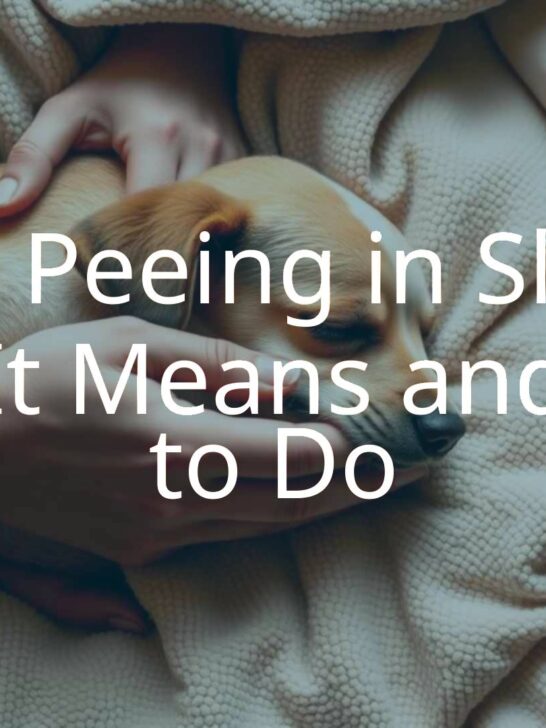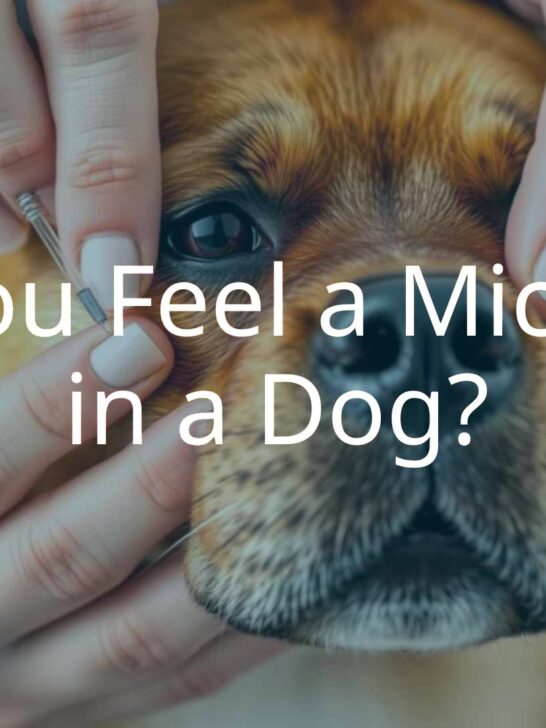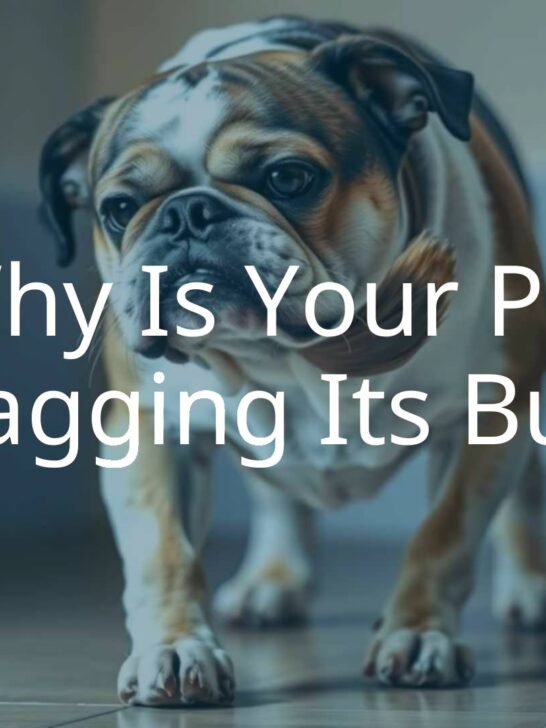Dog Peeing in Sleep: Causes, Concerns, and Solutions
Finding that your dog has urinated while asleep can be surprising and worrying. It isn’t just an annoyance-this may point to a health problem that should be looked at. When a dog pees without meaning to while sleeping or resting, it is called urinary incontinence. This is different from intentional marking or accidents from poor house training. With incontinence, your dog doesn’t realize they are urinating, and the leakage can be minor or much more obvious. Knowing the differences can help you find a solution and keep your dog comfortable and healthy.

Dogs are such an important part of our lives, and as caring owners, it’s up to us to help them with every health problem-even the ones that feel embarrassing. Dogs peeing during sleep isn’t as unusual as you might think, and there are different possible causes. In this guide, you’ll learn why dogs might pee when they sleep, what signs to look out for, when to see the vet, and what treatments and home management can help your pet.
Is It Normal for a Dog to Pee in Their Sleep?
Although accidents can sometimes happen-especially in very young puppies or under odd circumstances-regularly peeing during sleep is not normal in a healthy adult dog. Normally, adult dogs have full control of their bladders, even while sleeping deeply. If you find wet areas where your dog sleeps, or notice their rear is damp, this often means something is wrong. It usually points to urinary incontinence, where your dog pees without realizing it.
It’s important to know the difference between an “accident” and true incontinence. An accident could happen if your dog tries to wait but can’t hold it any longer. That dog knows they’re urinating. With incontinence, your dog doesn’t know at all; their muscles relax too much during sleep and urine leaks out without their knowledge.
Normal Dog Urination and Sleep
A healthy adult dog will typically pee three to five times a day, though this number can change based on how much water they drink, what they eat, and how active they are. Dogs learn to wait longer between pee breaks, especially overnight, and they’ll often wake up to let you know when they need to go out. If a dog suddenly starts urinating during sleep, it’s a change from their usual pattern and may mean a medical problem.
During sleep, the muscles that control the bladder relax. If these muscles are weak or if there’s another problem, this can cause pee to leak when the dog can’t control it. This is not the same as marking or stress-related peeing that happens when the dog is awake.
Puppies vs. Adults: What’s Expected?
For small puppies, peeing while asleep can happen simply because they’re not developed enough to control their bladders yet. Puppies under about five months old need frequent potty breaks, including at night. If you don’t take them out often enough, they’ll have accidents, which might include wetting their bedding or crate. As puppies grow and get more training, these accidents should stop.
When an older puppy or adult dog pees during sleep, it’s more serious. Any adult or senior dog suddenly peeing in sleep should see a vet, as this is usually a sign of a health issue-it’s not just about needing more bathroom breaks or more training like with a young puppy.
What Causes a Dog to Pee in Their Sleep?
There are a number of reasons why a dog might pee while asleep, ranging from mild to serious health problems. It’s often a sign of urinary incontinence, where your pet loses control of their bladder involuntarily. Here are some possible causes:
| Cause | Description | Most Common In |
|---|---|---|
| Urinary Incontinence | Dog loses control and doesn’t know when it’s happening, often during sleep or rest. | Middle-aged and senior female dogs |
| Urinary Tract Infections (UTIs) | Bacterial infection causes irritation, frequent urination, and can lead to leaks during sleep. | Dogs of all ages |
| Hormonal Imbalance (esp. after spaying/neutering) | Drop in estrogen (females) or testosterone (males) can weaken the sphincter muscles controlling the bladder. | Spayed females, neutered males |
| Age-Related Muscle Weakness | Older dogs sometimes lose strength in the muscles keeping urine in. | Senior dogs |
| Birth Defects | Problems present from birth, such as misshapen urinary structures, can cause lifelong incontinence. | Puppies, younger dogs |
| Neurological or Spinal Issues | Injury or disease affecting nerves can stop a dog from feeling or controlling their bladder. | Dogs with spinal/nervous system problems |
| Anesthesia or Surgery Effects | Anesthetic drugs relax muscles, causing temporary loss of control after procedures. | Any dog after surgery |
| Other Health Problems | Diabetes, Cushing’s disease, kidney problems, bladder stones or tumors make the bladder fill quickly or prevent holding urine. | Any dog with these conditions |
| Cognitive Changes/Dementia | Older dogs may forget house training or not realize they need to go out. | Senior dogs |
| Anxiety, Stress, Excitement | Strong emotions sometimes cause accidents, although this doesn’t usually happen during sleep. | Puppies, anxious dogs |
| Not Housebroken | Puppies or adolescent dogs may simply need more training, not suffering from incontinence. | Puppies, recent rescues |
How Do I Know if My Dog Has Urinary Incontinence?
The main sign of incontinence is that your dog has no idea they’re peeing. This is different from accidents where the dog is awake and just couldn’t wait.
Signs and Symptoms
- Wet patches where your dog sleeps or rests
- Their back end is damp or has urine on fur
- Increased licking of genitals, from irritation
- Dribbles of urine while moving or after urinating
- Stronger smell of urine on your dog or bedding
- Red, irritated skin near the private parts (urine scalding)
When Nighttime Accidents Are a Concern
If you’re regularly waking up to find your dog has wet their bed and they seem unaware, this is usually incontinence, not just a potty training slip. Dogs with incontinence don’t realize this is happening, while those with regular accidents often try to alert you or act guilty after.
Difference Between Incontinence and Marking
- Marking is intentional, usually a small amount, often on upright areas, and happens when the dog is awake.
- Incontinence happens while asleep or at rest, with larger amounts, and your dog does not know they’re doing it.
If you are unsure, a vet visit can help rule out health causes for accidents in the house.
When Should I Call the Vet?
Anytime your dog pees in their sleep, you should check with your veterinarian. Even a few drops can lead to infections or skin issues down the line. Acting early helps prevent more serious problems.
Red Flags That Need Quick Vet Attention
- Nighttime accidents are happening more often or are larger
- Your dog strains or shows pain when peeing
- Urine looks odd (cloudy, smells strong, contains blood)
- Your dog is drinking more than usual
- Eating habits or weight have changed for no obvious reason
- Your dog is weak, tired, or confused
- Constant licking of their genitals
- Any other new or odd symptoms
If you see these signs with sleep peeing, schedule a vet visit soon. These symptoms could point to something more serious.
How Vets Figure Out What’s Wrong
When your dog is seen for peeing in their sleep, the vet may:
- Ask about your dog’s habits, changes, diet, and symptoms
- Do a full physical check
- Run a urinalysis to check for infection or other issues
- Order blood tests to see if conditions like diabetes, kidney, or other illnesses are present
- Use X-rays or ultrasound to look for growths or bladder stones
- Test nerves and muscles if they suspect a neurological cause
- Sometimes use a small camera to view the inside of the urinary tract (cystoscopy)
- Rarely, run tests for bladder pressure
With these results, your vet will suggest the best treatment for your dog’s specific needs.
What Can Be Done for Dogs Peeing in Sleep?
How your dog is treated depends on the cause. Many types of urinary incontinence can be helped with medicine, surgery, or changes in daily care. Here are some common options:
Medication and Medical Treatment
- Hormone treatments: For spayed females, medications like Incurin provide hormones that help tighten the muscles that hold in urine.
- Urethral muscle strengtheners: Drugs such as phenylpropanolamine (Proin) boost the muscle tone needed to keep the bladder sealed. Sometimes both this and a hormone are used at once.
- Antibiotics: If a UTI is the reason, a simple antibiotic course usually clears things up.
- Other health problem medicine: If diseases like diabetes or Cushing’s are causing peeing, those conditions need direct treatment.
- Other meds: Occasionally, anti-anxiety medicine (like imipramine) may help if the bladder is overactive.
Dogs on these medicines should be checked now and then by a vet, including checking blood pressure for dogs on Proin.
Hormonal and Non-Hormonal Therapies
Most bladder incontinence from weak muscles is treated with either hormone-based drugs or muscle-tightening drugs. These medicines usually control the problem well, but most dogs will need to keep taking them for the rest of their lives.
About 70% of dogs with this kind of incontinence do well on medicine alone.
Surgery for Physical Problems
- Moving the ureter: Rare birth defects can be fixed by surgery to direct urine to the right place in the bladder.
- Removing stones or tumors: Surgery may be needed if these are blocking normal peeing.
- Collagen injections: Injections to help seal the bladder are being used in some cases.
- Advanced surgical fixes: Other options like adjusting the location and support of the bladder are available but used less often.
New treatments, like stem cell therapy and botulinum toxin, are being studied but aren’t widely used yet.
What to Expect Long-Term
Most dogs with incontinence can be managed well so they and their owners can live more comfortably. While some dogs may not be fully dry, medicine and care usually bring big improvements.
What Can Owners Do at Home?
Along with vet care, there are several practical steps you can try at home to support a dog who pees while sleeping.
Frequent Bathroom Breaks and Routine
- Let your dog out more often, especially before bed and early in the morning
- Stick to a regular schedule for bathroom breaks
- Give another late-night chance right before you sleep, especially for older dogs or those with severe leaks
Water Intake and Hydration
- Never limit water unless your vet tells you
- Make sure your dog isn’t dehydrated (which can make problems worse)
- You can remove the water bowl an hour or two before bedtime, but don’t keep your dog thirsty
Using Diapers and Protective Bedding
- Doggie diapers and pee pads can help keep your dog and home cleaner
- Washable, waterproof beds or pads protect furniture and stop sores from constant wetness
- Materials that move moisture away from your pet’s skin are best for comfort
Calm, Clean Environment
- Don’t punish your dog-they can’t help this kind of accident
- Offer lots of encouragement for going outside
- Keep sleeping areas clean and easy to access
- A peaceful home lessens anxiety, which can make some problems worse
Are Natural Remedies or CBD Helpful?
Many people are interested in natural supplements like CBD to help their pets. However, there isn’t strong evidence that these treat urinary incontinence directly. While some owners feel their dogs are less anxious or more comfortable with CBD, this should not replace normal veterinary treatment.
If you want to try any supplement, always check with your vet first to rule out side effects or problems with other medications. Don’t rely just on alternative treatments for a dog peeing in its sleep, as they rarely solve the root of the problem.
Frequently Asked Questions
Is Incontinence Only Seen in Older Dogs?
No. While older dogs are more likely to have trouble with bladder control because of weak muscles, young dogs can have incontinence too. In puppies, it’s usually due to training or a birth problem. In adults, infections, hormone issues, or illnesses can also cause it.
Will Puppies Outgrow Nighttime Peeing?
Most will. Young puppies haven’t learned to control their bladders yet. With regular training and as their muscles mature-usually around 5 months-they stop having nighttime accidents. If an older puppy keeps having issues, ask a vet for advice.
Does Spaying or Neutering Cause Incontinence?
It can, especially in females. Removing the ovaries means less estrogen, which weakens the muscle that closes off the bladder. This affects about one in five spayed females, mainly large breeds or those spayed early. Male dogs can also be affected after neutering, but it’s not as common or as severe. Prescription medicines often help both males and females with this problem.























